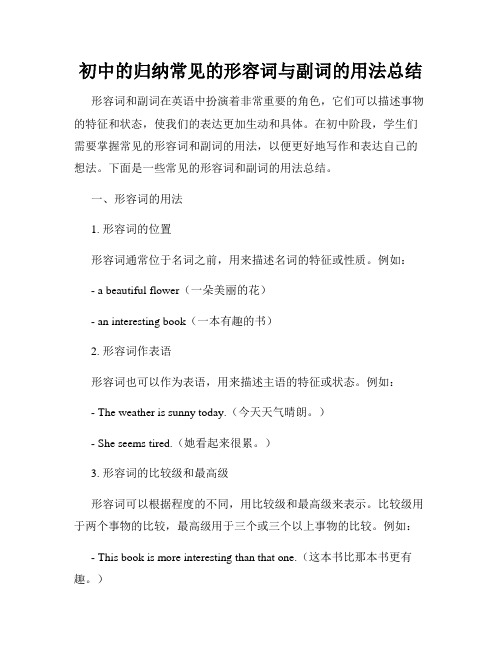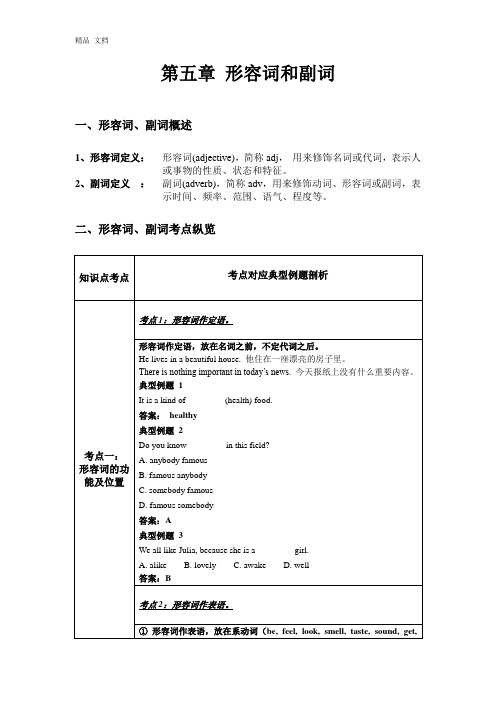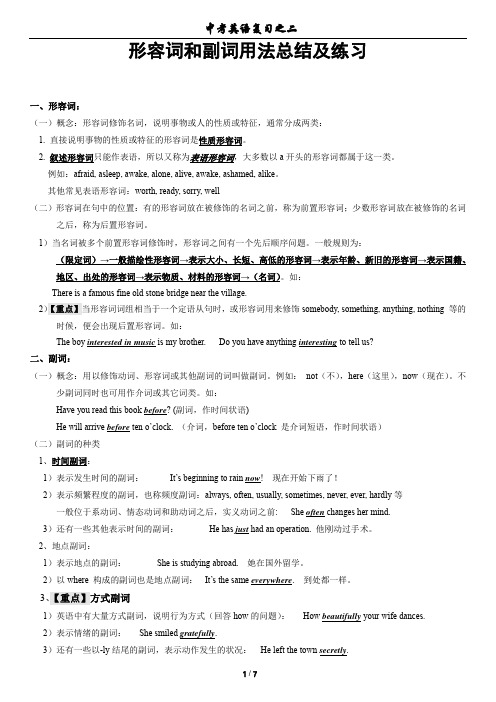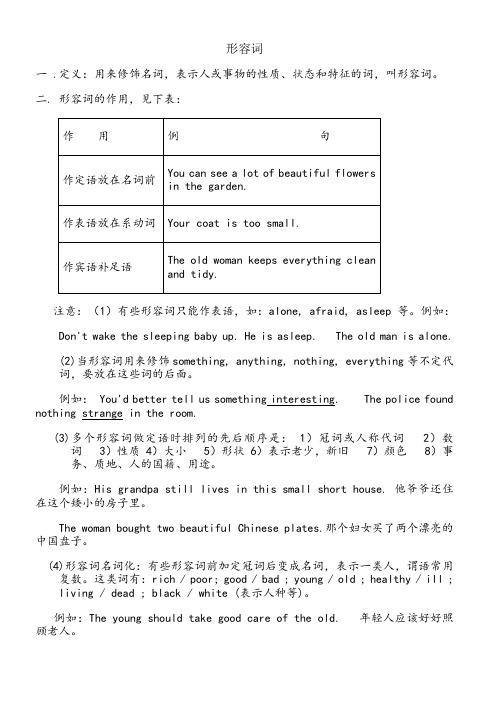初中英语形容词与副词用法讲解
初中的归纳常见的形容词与副词的用法总结

初中的归纳常见的形容词与副词的用法总结形容词和副词在英语中扮演着非常重要的角色,它们可以描述事物的特征和状态,使我们的表达更加生动和具体。
在初中阶段,学生们需要掌握常见的形容词和副词的用法,以便更好地写作和表达自己的想法。
下面是一些常见的形容词和副词的用法总结。
一、形容词的用法1. 形容词的位置形容词通常位于名词之前,用来描述名词的特征或性质。
例如:- a beautiful flower(一朵美丽的花)- an interesting book(一本有趣的书)2. 形容词作表语形容词也可以作为表语,用来描述主语的特征或状态。
例如:- The weather is sunny today.(今天天气晴朗。
)- She seems tired.(她看起来很累。
)3. 形容词的比较级和最高级形容词可以根据程度的不同,用比较级和最高级来表示。
比较级用于两个事物的比较,最高级用于三个或三个以上事物的比较。
例如:- This book is more interesting than that one.(这本书比那本书更有趣。
)- English is the most widely spoken language in the world.(英语是世界上使用最广泛的语言。
)二、副词的用法1. 副词的位置副词通常位于动词之前,用来修饰动作的方式、程度或频率。
例如:- He runs fast.(他跑得快。
)- She speaks English fluently.(她流利地讲英语。
)2. 副词作状语副词可以作为状语,用来描述动词、形容词或其他副词的方式、程度或频率。
例如:- He sings loudly.(他大声唱歌。
)- The car is too expensive.(这辆车太贵了。
)3. 副词的比较级和最高级副词的比较级和最高级的形式和用法与形容词类似。
例如:- She runs faster than her brother.(她跑得比她哥哥快。
初一英语形容词和副词语法知识总结(讲解+考点+综合练习):形容词和副词

第五章形容词和副词一、形容词、副词概述1、形容词定义:形容词(adjective),简称adj,用来修饰名词或代词,表示人或事物的性质、状态和特征。
2、副词定义:副词(adverb),简称adv,用来修饰动词、形容词或副词,表示时间、频率、范围、语气、程度等。
二、形容词、副词考点纵览三、综合练习( )1. –If you don’t like the red coat, how about the green one?–OK, but do you have _______ size in green? This one is a bit small for me.A. a bigB. a biggerC. the bigD. the bigger( )2. –Mum, I think I’m _______ to get back to school.–Not really, my dear. You’d better stay at home for anoth er day or two.A. so wellB. so goodC. well enoughD. good enough ( )3. –What delicious cakes! –They will taste _______ with butter.A. goodB. betterC. badD. worse( )4. –Mr. Zhou , of all the students in our group, who lives _______ ?–I think Li Lei does.A. farB. fartherC. farthestD. the farther( )5. With a history of more than 1,400 years, ZhaoZhou Bridge is the _______ stone arch bridge in the world .A. oldB. olderC. oldestD. elder( )6. Bob never does him homework _______ Mary. He makes lots of mistakes.A. so careful asB. as carefully asC. carefully asD. as careful as ( )7. A: How can I speak English _______ you?B: You’d better speak more, I think.A. as good asB. more thanC. as well asD. as much as( )8. Your English is good. I’ll try my best to speak it as _______you do.A. clearly asB. clear asC. clearer thanD. more clearly ( )9. –Is your mother badly ill?–No, _______ , only a little cold.A. serious anythingB. serious nothingC. nothing seriousD. anything serious( )10. I’m not sure if I’m going to Tim’s party; I may go to the concert _______ .A. onlyB. insteadC. earlyD. late( )11. Although they are brothers, they are the _______ opposite of one another.A. veryB. justC. fewD. little( )12. The new Bright Restaurant is _______ than the old one. Moore and more people like to eat there.A. goodB. betterC. badD. worse( )13. Wang Ping does _______ in physics that I missed the first class.A. badlyB. Most badlyC. worseD. worst( )14. I got up so _______ this morning that I missed the first class.A. earlyB. lateC. quietlyD. neatly( )15. –Do you enjoy traveling by plane?–No. It’s _______ expensive.A. much moreB. more muchC. too muchD. much too( )16. I’m afraid the headmaster is _______ busy to meet the visitors.A. too muchB. much tooC. so muchD. much too( )17. How beautifully she sings! I’ve never heard _______ .A. the better voiceB. a good voiceC. the best voiceD. a better voice( )18. You do well in your lessons. I’m _______ you will pass the exam.A. sureB. afraidC. sadD. sorry( )19. –Who is _______ in your class?–Fred.A. tallB. tallerC. tallestD. the tallest( )20. –What do you think of the football match?–Wonderful! The Chinese football team has never played _______ .A. betterB. bestC. worseD. worst( )21. The population of China is _____ than _____ of any other country in the world.A. larger , the oneB. more , thatC. larger , thatD. more , the one ( )22. There is much wine here, but _______ people want to drink it.A. manyB. a littleC. fewD. a few( )23. People speak ______ of the film Not One Less. It is really necessary for every child to go to school.A. loudB. loudlyC. highD. highly( )24. She always finishes her homework on time. She ______ leaves it for tomorrow.A. alwaysB. neverC. usuallyD. sometimes( )25. The football match was _______, so the boys were _______ about it.A. excited , excitingB. exciting, excitedC. excited , excitedD. exciting , exciting( )26. Playing table tennis isn’t difficult. You can learn it _______.A. easyB. easilyC. quickD. hardly( )27. We Chinese always put our family name _______.A. lastB. nearlyC. firstD. in the middle ( )28. This kind of T-shirt look _______ and sells _______ in the market.A. nice, goodB. well , wellC. nice , wellD. good , nice( )29. The light in the room wasn’t _______ for me to read.A. brightly enoughB. enough brightlyC. enough brightD. bright enough( )30. –Look, this digital camera is really cheap! It’s only five hundred yuan.–The _______ , the better. I’m short _______ money, you know.A. cheaper , ofB. cheap, forC. expensive , ofD. more expensive , for( )31. Which subject do you like _______ , math, Chinese or English?A. betterB. bestC. wellD. very much( )32. _______ little water is not enough for _______ many people.A. Such , soB. So , soC. Such , suchD. So , such( )33. English is spoken by _______ people.A. a lotB. much manyC. a large number ofD. a great deal of ( )34. –Isn’t that Mary?–Yes, she always has a(an) _______ smile on her face.A. aloneB. kindlyC. ownD. friendly( )35. –Do you prefer music to drawing?–No. I like drawing _______.A. wellB. mostC. betterD. best( )36. Since China has been a member of the WTO, English is ______ useful than before.A. moreB. mostC. muchD. very( )37. Can you speak a little louder? I can _______ hear you.A. hardB. reallyC. hardlyD. clearly( )38. China has a _______ population and long history.A. manyB. largeC. muchD. big( )39. Do you have _______ to say?A. important anythingB. anything importantC. important somethingD. something important( )40. Which is _______ , English or Chinese?A. interestingB. interestingerC. more interestingD. most interesting( )41. –The TV programme is boring. Shall we play chess intead?–All right. That is _______ than watching a boring programme.A. very goodB. much goodC. very betterD. much better( )42. –Mum, could you buy me a dress like this?–Certainly, we can buy _______ one than this, but _______ this.A. a better, better thanB. a worse , as good asC. a cheaper , as good asD. a more important , not as good as ( )43. Let’s enjoy the song Yesterday Once More. It sounds _______.A. wellB. sadlyC. niceD. bad( )44. –Is the physics problem _______ ?–Yes. I can work it out _______.A. easy , easilyB. easy, easyC. easily , easyD. easily , easily ( )45. Hainan is a very large island. It’s the second _______ island in China.A. largeB. largerC. largerD. most large( )46. What a _______ cough! You seem _______ ill.A. terrible, terriblyB. terribly , terribleC. terrible , terribleD. terribly , terribly ( )47. I’m not sure whether Mary can sing _______ Mabel.A. as well asB. as good asC. so good asD. as better as( )48. Chinese is _______ more difficult than English.A. mostB. veryC. manyD. much( )49. The _______ old man told his son to be a good boy.A. diedB. deadC. dyingD. death( )50. Today my sister is feeling _______ to go to the factory.A. enough goodB. good enoughC. well enoughD. enough well参考答案精品文档1—5 B C B C C6—10 B C A C B11—15 A B D B D16—20 B D A D A21—25 C C D B B26—30 B C C D A31—35 B B C D C36—40 A C B B C文档说明(Word文档可以删除编辑)专注于精品文档:中考、高考、数学语文英语试卷、高中复习题目、小学试卷教案合同协议施工组织设计、期中、期末等测试,本文档目的是为了节省读者的工作时间,提高读者的工作效率,读者可以放心下载文档进行编辑使用.文档来源网络改编,审核有可能疏忽,如果有错误或侵权,请联系本店马上删除。
英语形容词与副词的区别与用法总结

英语形容词与副词的区别与用法总结英语中,形容词和副词是非常重要的词性,它们在句子当中起着不同的作用。
正确理解和运用形容词和副词可以使我们的语言更加准确、丰富,下面是对英语形容词与副词的区别与用法的总结。
一、形容词的定义和用法形容词用来描述、修饰名词或代词,表达事物的性质、状态、特征等。
形容词通常在名词前面,用于对名词进行修饰和限定。
形容词能够回答“是什么样子”的问题。
例如:1. She has a beautiful voice.(她有一种美丽的声音。
)2. The red flowers in the garden are blooming.(花园里的红花正在盛开。
)二、副词的定义和用法副词用来修饰动词、形容词、副词和整个句子,用来表示动作或状态的方式、程度、时间、地点、原因等。
副词通常在句子中较灵活地放置,可以出现在句首、句中或句尾。
副词能够回答“怎样”、“何时”、“为什么”等问题。
例如:1. He speaks English fluently.(他英语讲得很流利。
)2. They ran quickly to catch the bus.(他们快速地跑去赶公共汽车。
)三、形容词和副词的区别1. 词性区别形容词是名词的修饰语,用来修饰名词,用于描述名词的特征、属性等。
副词是修饰动词、形容词、副词或整个句子的词语,用来表示动作、程度、方式、时间等。
2. 位置区别形容词通常位于名词之前,用来修饰名词。
而副词则没有固定位置,可以出现在句首、句中或句尾,修饰其他词性。
3. 用法区别形容词用于修饰名词,限定说明名词的特征,可以起到具体化的作用。
副词则用于修饰动词、形容词、副词或整个句子,描述动作的方式、程度、时间等。
四、形容词与副词的转化在英语中,有些词既可以作形容词又可以作副词,例如fast(快的/快地)、hard(困难的/努力地),这些词在句子中的位置和语境决定了它们的具体词性。
例如:1. They walked fast.(他们快速地走着。
英语形容词_副词讲解

1. 某些形容词加上定冠词可以泛指一类人,与谓语动词 的复数连接。如:the dead,the living,the rich, the poor,the blind,the hungry (The poor are losing hope. ) 2. 有关国家和民族的形容词加上定冠词指这个民族的整 体,与动词的复数连用。例如:the British,the English,the French,the Chinese. (The English have wonderful sense of humor. ) 多个形容词修饰名 词的顺序 多个形容词修饰名词时,其顺序为: 限定词--数词--描绘词--(大小,长短,形状,新旧,颜色) --出处--材料性质,类别--名词 例如: a small round table a tall gray building a dirty old brown shirt a famous German medical school an expensive Japanese sports car
9. 表示主语长期的静止状态,不强调动作的sit,stand,lie 接形容词quiet, silent, still, red, peaceful等 The valley lay quiet and peaceful She sat silent. They stood still. 10. become,fall ,get,go,turn表示变得时后跟形容词. The leaves fell/got/went/turned yellow. It fell/got/went/turned cold. 11. present表示出席的,到场的的时候常放在名词后,the members present表示现在的则放在名词前the present members 12. live有时可用做形容词: a live fish 活鱼(形容动物, 不形容人 ) The broadcast comes to you live from Canada 实况转播 That wire is live 电线是带电的 lively 生动的,活泼的。His class is often lively. 13. the +adj表示一类人,是复数The rich should help the poor. the blind/wounded/young/old
中考英语形容词和副词用法总结

形容词和副词用法总结及练习一、形容词:(一)概念:形容词修饰名词,说明事物或人的性质或特征,通常分成两类:1. 直接说明事物的性质或特征的形容词是性质形容词。
2. 叙述形容词只能作表语,所以又称为表语形容词,大多数以a开头的形容词都属于这一类。
例如:afraid, asleep, awake, alone, alive, awake, ashamed, alike。
其他常见表语形容词:worth, ready, sorry, well(二)形容词在句中的位置:有的形容词放在被修饰的名词之前,称为前置形容词;少数形容词放在被修饰的名词之后,称为后置形容词。
1)当名词被多个前置形容词修饰时,形容词之间有一个先后顺序问题。
一般规则为:(限定词)→一般描绘性形容词→表示大小、长短、高低的形容词→表示年龄、新旧的形容词→表示国籍、地区、出处的形容词→表示物质、材料的形容词→(名词)。
如:There is a famous fine old stone bridge near the village.2)【重点】当形容词词组相当于一个定语从句时,或形容词用来修饰somebody, something, anything, nothing 等的时候,便会出现后置形容词。
如:The boy interested in music is my brother. Do you have anything interesting to tell us?二、副词:(一)概念:用以修饰动词、形容词或其他副词的词叫做副词。
例如:not(不),here(这里),now(现在)。
不少副词同时也可用作介词或其它词类。
如:Have you read this book before? (副词,作时间状语)He will arrive before ten o’clock. (介词,before ten o’clock 是介词短语,作时间状语)(二)副词的种类1、时间副词:1)表示发生时间的副词:It’s beginning to rain now! 现在开始下雨了!2)表示频繁程度的副词,也称频度副词:always, often, usually, sometimes, never, ever, hardly等一般位于系动词、情态动词和助动词之后,实义动词之前: She often changes her mind.3)还有一些其他表示时间的副词:He has just had an operation. 他刚动过手术。
初中英语形容词和副词的用法

形容词一 .定义:用来修饰名词,表示人或事物的性质、状态和特征的词,叫形容词。
二. 形容词的作用,见下表:注意:(1)有些形容词只能作表语,如:alone, afraid, asleep 等。
例如:Don't wake the sleeping baby up. He is asleep. The old man is alone.(2)当形容词用来修饰something, anything, nothing, everything等不定代词,要放在这些词的后面。
例如: You'd better tell us something interesting. The police found nothing strange in the room.(3)多个形容词做定语时排列的先后顺序是: 1)冠词或人称代词 2)数词 3)性质 4)大小 5)形状 6)表示老少,新旧 7)颜色 8)事务、质地、人的国籍、用途。
例如:His grandpa still lives in this small short house. 他爷爷还住在这个矮小的房子里。
The woman bought two beautiful Chinese plates.那个妇女买了两个漂亮的中国盘子。
(4)形容词名词化:有些形容词前加定冠词后变成名词,表示一类人,谓语常用复数。
这类词有:rich / poor; good / bad ; young / old ; healthy / ill ;living / dead ; black / white (表示人种等)。
例如:The young should take good care of the old. 年轻人应该好好照顾老人。
三.以-ly结尾的形容词1)大部分形容词加-ly可构成副词。
但 friendly,deadly,lovely,lonely,likely,lively,ugly,brotherly,仍为形容词。
形容词和副词的知识点归纳
形容词和副词的知识点归纳一、形容词。
1. 定义与作用。
- 形容词主要用来描写或修饰名词或代词,表示人或事物的性质、状态、特征或属性。
例如:“a beautiful flower”(美丽的花朵),“beautiful”修饰名词“flower”,描述花的特征。
2. 形容词的位置。
- 前置修饰:- 一般情况下,形容词位于名词之前,作定语。
如:“a tall boy”(一个高个子男孩)。
- 当有多个形容词修饰同一个名词时,存在一定的顺序:限定词(如a, an, the 等)+描绘性形容词(如beautiful, nice等)+大小、长短、高低等形容词(如big, small等)+形状形容词(如round, square等)+年龄、新旧形容词(如new, old 等)+颜色形容词(如red, blue等)+国籍、地区形容词(如Chinese, American 等)+材料形容词(如wooden, plastic等)+用途、类别形容词(如writing, reading等)。
例如:“a beautiful small round new red Chinese woodenwriting desk”(一张漂亮的、小的、圆的、新的、红色的、中国的、木制的写字台)。
- 后置修饰:- 当形容词修饰不定代词(something, anything, nothing等)时,形容词后置。
例如:“There is something important to tell you.”(有一些重要的事情要告诉你)。
- 在一些固定结构中,形容词后置,如“the people present”(在场的人)。
3. 形容词的比较级和最高级。
- 规则变化:- 一般在词尾加 -er(比较级)和 -est(最高级)。
如:tall - taller - tallest。
- 以不发音的e结尾的单词,加 -r和 -st。
如:nice - nicer - nicest。
形容词和副词的知识点归纳英语
形容词和副词的知识点归纳英语一、形容词。
1. 定义与作用。
- 形容词主要用来修饰名词,表示人或事物的性质、状态和特征等。
例如:a beautiful flower(美丽的花朵),“beautiful”描述了“flower”的特征。
2. 形容词的位置。
- 前置修饰:一般放在所修饰的名词之前。
如:a tall boy(一个高个男孩)。
- 后置修饰:- 当修饰不定代词时,形容词后置。
例如:something interesting(有趣的事情)。
- 在一些固定结构中,如“the +形容词”表示一类人时,形容词后置。
例如:the old(老人),the young(年轻人)。
3. 形容词的比较级和最高级。
- 比较级的构成。
- 一般在形容词词尾加 -er。
例如:tall - taller。
- 以e结尾的形容词,直接加 -r。
如:nice - nicer。
- 重读闭音节,双写尾字母再加 -er。
例如:big - bigger。
- 以“辅音字母 + y”结尾的形容词,把y变为i再加 -er。
如:heavy - heavier。
- 不规则变化:good/well - better,bad/badly - worse,many/much - more 等。
- 最高级的构成。
- 一般在形容词词尾加 -est。
例如:tall - tallest。
- 以e结尾的形容词,直接加 -st。
如:nice - nicest。
- 重读闭音节,双写尾字母再加 -est。
例如:big - biggest。
- 以“辅音字母 + y”结尾的形容词,把y变为i再加 -est。
如:heavy - heaviest。
- 不规则变化:good/well - best,bad/badly - worst,many/much - most 等。
- 比较级和最高级的用法。
- 比较级用于两者之间的比较,常用结构有:A+be+形容词比较级+than + B。
初中英语 形容词副词用法
初中英语形容词副词用法形容词(Adjectives)和副词(Adverbs)是英语中重要的词类,它们可以用来修饰名词、动词、形容词以及其他副词,增添语言表达的丰富性。
本文将介绍初中英语中形容词和副词的基本用法及一些常见的例子。
一、形容词的用法形容词主要用于描述名词的特征、性质或状态。
下面是形容词在句子中的一些常见使用方法:1. 修饰名词形容词通常位于名词之前,用来描述名词的特征或性质。
例如:- a beautiful girl(一个漂亮的女孩)- a big house(一幢大房子)2. 作表语形容词可以作为表语,用来描述主语的特征或状态。
通常放在系动词后面。
例如:- She is smart.(她很聪明。
)- The cake smells delicious.(蛋糕闻起来很美味。
)3. 作定语形容词也可以作为定语,修饰名词或代词。
通常位于名词之前。
例如:- a tall building(一座高楼)- an interesting book(一本有趣的书)二、副词的用法副词主要用来修饰动词、形容词或其他副词,表示程度、方式、时间、频率等。
下面是副词在句子中的一些常见使用方法:1. 修饰动词副词可以放在动词前面或后面,用来修饰动词,表示动作的方式、程度等。
例如:- He speaks loudly.(他大声说话。
)- They quickly finished their homework.(他们迅速完成了作业。
)2. 修饰形容词或副词副词可以用来修饰形容词或副词,表示程度或程度副词之间的关系。
通常放在被修饰词之前。
例如:- She is very beautiful.(她非常漂亮。
)- The movie is quite interesting.(这部电影相当有趣。
)3. 表示时间或频率副词还可以用来表示时间、频率或顺序。
例如:- We sometimes go to the park.(我们有时去公园。
九年级英语形容词和副词PPT课件
(3) A +be+比较级十than+ B 表示“A比B……”。如:
Planes are faster than trains.飞机比火车快。 (4) A+ be+ less+原级十than B 表示“A没有/不如B……”。如: Lucy is less careful than Lily.露西没有莉莉细心。 (5) the+比较级+…… ;the+比较级+……
领域密切合作”,closely修饰动词work,其他三项语意不符。故选A。
考点3 形容词和副词的比较等级
1.形容词和副词的比较等级的构成
(1)规则变化
构成方法
示例
一般在单音节词词尾加er或est
small→smaller→smallest; fast→faster→fastest;
quick→quicker→quickest
Bill gets up late on weekends.
比尔在周末起得晚。
Life here is rich and
作后置定语,多表示时间或地点
interesting.
这里的生活既丰富多彩又有趣。
2.形容词和副词的转换形式 副词一般由形容词变化而来,常见的变化规则如下:
变化规则 大多数在形容词词尾加 ly
九年级英语 形容词和副词
考点1 形容词 1.形容词的基本用法
用法 作定语,用于名词前或不定
代词后
作表语,用于系动词后
作宾语补足语,常用于keep, make,leave等动词的宾语
后
例句 Han Mei is a beautiful girl.
韩梅是一个漂亮的女孩。 The meal is very delicious.
